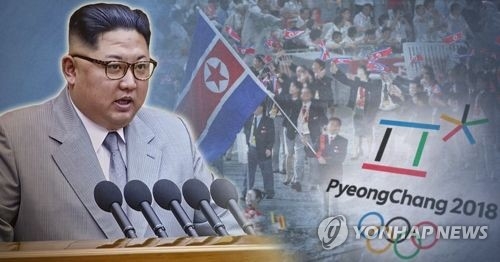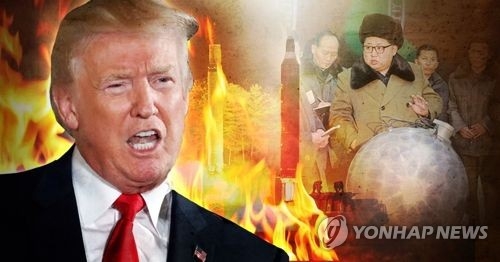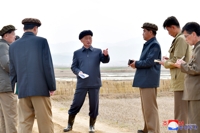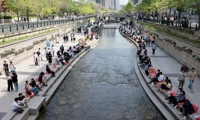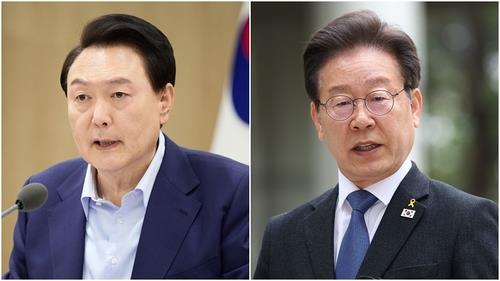(News Focus) N.K.'s olive branch toward Seoul targets breakthrough amid sanctions: experts
By Kim Soo-yeon
SEOUL, Jan. 1 (Yonhap) -- North Korean leader Kim Jong-un's offer of an olive branch toward South Korea is seen as an attempt to use better inter-Korean ties to break the current stalemate amid deepening international sanctions, experts here said Monday.
They also called for close coordination between Seoul and Washington in handling the North's nuclear issue as Pyongyang appears to seek to drive a wedge in the alliance by maintaining its military threat against the United States.
The North's leader said in his New Year's Day message that his country could send a delegation to the PyeongChang Winter Olympics to be held in the South next month, wishing for the event's success.
"We are ready to take various steps, including the dispatch of the delegation. To this end, the two Koreas can immediately meet," Kim said in a televised speech.
His speech came as international pressure and sanctions are mounting over the North's defiant pursuit of nuclear weapons and missiles.
"North Korea appears to be trying to use the PyeongChang Olympics as a momentum for dialogue," said Kim Yong-hyun, a professor at Dongguk University. "South Korea needs to consider sending a special envoy to the North for sports talks."
The North's conciliatory message is expected to lend support to liberal President Moon Jae-in's drive to bring peace to the divided peninsula through the North's participation in the Winter Games.
South Korea will host its first Winter Olympics in PyeongChang, 180 kilometers east of Seoul, from Feb. 9-25. The Paralympics will be held from March 9-18.
Moon earlier proposed to the U.S. that the allies delay their joint military drills that could coincide with the Olympics or the Paralympics. The North has long denounced the exercises as a war rehearsal and used it as an excuse for its provocations.
The North sent a delegation of three high-ranking officials -- Hwang Pyong-so, Choe Ryong-hae and late Kim Yang-gon -- to the closing ceremony of the 2014 Asian Games held in Incheon, South Korea's second-largest port city.
If the North dispatches a similar group of ranking officials to the Winter Games, the move could help restore suspended inter-Korean communication channels and long-stalled dialogue.
The North has kept mum toward the South's July offer for military talks and dialogue for holding reunions of war-torn families. It has also rejected South Korean civilian groups' bid for aid and exchanges.
But in the New Year's message, Kim hinted at efforts to spur inter-Korean civilian exchanges and hold dialogue at various levels.
"It is noteworthy that Kim expressed active will to improve inter-Korean relations based on the announcement that his country has completed its state nuclear force," said Cheong Seong-chang, a senior research fellow at the Sejong Institute.
But while launching a peace offensive toward Seoul, the North's leader also made it clear to the U.S. that his country has no intent to give up its nuclear and missile programs.
"The U.S. should be aware that its whole territory is within the range of our nuclear attacks and a 'nuclear button' is always placed on the desk of my office," Kim said. "This is a reality, not a threat."
Analysts previously predicted that the North's leader may launch a peace offensive toward Washington on the assumption that he may want to hold talks on the basis of its proclaimed nuclear state status.
But Pyongyang reaffirmed its vow to build on its nuclear deterrent against Washington, calling for mass-producing nuclear weapons and ballistic missiles, and deploying them this year.
"As the weaker power, North Korea feels it needs the U.S. to make the first move before it will consider a diplomatic path. Therefore, it will continue its hard-line stance in hopes that the Trump administration will blink first," said Ken Gause, a senior analyst at the U.S.-based CNA Corp.
"By taking a mixed approach to Seoul and Washington, North Korea seems likely to continue with its strategy of trying to drive a wedge in the alliance," he added.
Tensions between the U.S. and North Korea heightened last year as U.S. President Donald Trump and Kim traded bellicose rhetoric and personal insults.
The U.S. has said that all options, including military action, are on the table though it prefers diplomacy to resolve North Korea's nuclear issue. Pyongyang has stressed that it will not put its nuclear weapons on the negotiation table.
"The North showed a strong will to put its nukes on an operational deployment by mentioning a nuclear button," said a military official. "The country is expected to focus on advancing a nuclear-tipped long-range missile and could carry out weapon tests after taking into account the situations."
Trump is preaching for the campaign of "maximum pressure" on the North. Moon took office in May with vows to take a dual approach of pressure and dialogue in handling the North, but he also hopes to take an initiative when it comes to issues on the peninsula.
Experts cautioned against too much optimism about the North's latest proposal, stressing that the South should closely coordinate with the U.S. in dealing with Pyongyang.
"North Korea showed a change in its tack as it tries to talk with Seoul while shunning the U.S., in an about-face from its previous stance," said Yang Moo-jin, a professor at the University of North Korean Studies. "The government needs close coordination with Washington (in seeking understanding for its push for talks with Pyongyang)."
sooyeon@yna.co.kr
(END)
-
 Overdue debut of Korean abstract art pioneer Yoo Young-kuk at Venice Biennale
Overdue debut of Korean abstract art pioneer Yoo Young-kuk at Venice Biennale -
 Defense chief says N. Korea's hypersonic missile 'unsuccessful' in last-stage glide flight
Defense chief says N. Korea's hypersonic missile 'unsuccessful' in last-stage glide flight -
 Relax, immerse yourself in scents at Venice Biennale's Korean Pavilion
Relax, immerse yourself in scents at Venice Biennale's Korean Pavilion -
 N. Korea has capability to genetically engineer biological military products: U.S. report
N. Korea has capability to genetically engineer biological military products: U.S. report -
 S. Korea marks 30th anniv. of Korean Pavilion at Venice Biennale with contemporary art
S. Korea marks 30th anniv. of Korean Pavilion at Venice Biennale with contemporary art
-
 Overdue debut of Korean abstract art pioneer Yoo Young-kuk at Venice Biennale
Overdue debut of Korean abstract art pioneer Yoo Young-kuk at Venice Biennale -
 Relax, immerse yourself in scents at Venice Biennale's Korean Pavilion
Relax, immerse yourself in scents at Venice Biennale's Korean Pavilion -
 Artist Lee Bae captures ethereal Korean aesthetics at Venice Biennale
Artist Lee Bae captures ethereal Korean aesthetics at Venice Biennale -
 S. Korea marks 30th anniv. of Korean Pavilion at Venice Biennale with contemporary art
S. Korea marks 30th anniv. of Korean Pavilion at Venice Biennale with contemporary art -
 Defense chief says N. Korea's hypersonic missile 'unsuccessful' in last-stage glide flight
Defense chief says N. Korea's hypersonic missile 'unsuccessful' in last-stage glide flight
-
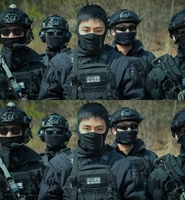 Facebook page unveils photos of BTS member V in counter-terrorism unit gear
Facebook page unveils photos of BTS member V in counter-terrorism unit gear -
 Gov't likely to accept university chiefs' request to lower med school enrollment quota
Gov't likely to accept university chiefs' request to lower med school enrollment quota -
 S. Korea not invited to G7 summit meeting this year: sources
S. Korea not invited to G7 summit meeting this year: sources -
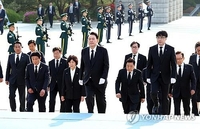 Yoon's approval rating sinks to lowest point since taking office
Yoon's approval rating sinks to lowest point since taking office -
 S. Korea to fully shift to 'endemic' from COVID-19 pandemic starting next month
S. Korea to fully shift to 'endemic' from COVID-19 pandemic starting next month
